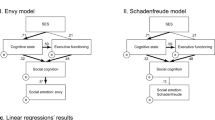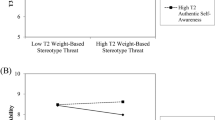Abstract
Background
Obesity is a highly stigmatizing condition, and reduced cognitive functioning is a stereotypical trait ascribed to individuals with obesity. In the present work, we tested the hypothesis that stereotype threat (i.e., a depletion of working memory resources due to the fear of confirming a negative self-relevant stereotype when a stereotype-related ability is assessed) contributes to cognitive deficits in individuals with obesity.
Methods
Computerized tests of (a) working memory and (b) probabilistic learning—an ability unrelated with working memory—were administered to a community sample of 131 adults. Stereotype threat was manipulated by altering the alleged nature of the tasks; the tasks were alternatively labeled as intelligence tests (high stereotype threat condition), memory and learning tests (standard instructions condition), or distraction games (low stereotype threat condition).
Results
A negative relation between body mass index (BMI) and working memory emerged in both the high stereotype threat (95% CIs = −0.872, −0.175, p = 0.003) and the standard instructions conditions (95% CIs = −0.974, −0.153, p = 0.007), but not in the low stereotype threat condition (95% CIs = −0.266, 0.430, p = 0.643). No effect emerged on probabilistic learning.
Conclusion
Stereotype threat is associated with impaired working memory of individuals with obesity. Implications for researchers and clinicians are discussed.
This is a preview of subscription content, access via your institution
Access options
Subscribe to this journal
Receive 12 print issues and online access
$259.00 per year
only $21.58 per issue
Buy this article
- Purchase on Springer Link
- Instant access to full article PDF
Prices may be subject to local taxes which are calculated during checkout
Similar content being viewed by others
Notes
To explore in detail whether the relation between MBI and working memory varied between the HST and the S condition (contrast 3), we repeated the same analysis by maintaining the S condition as the reference group. Results confirmed that the BMI by contrast three interactions was not significant, B = −0.040, SE = 0.272, p = 0.882, 95% CIs = −0.578, 0.498, thus meaning that the relation between BMI and working memory does not differ when the task is presented as a cognitive test, regardless of its alternative labeling either an “intelligence” (HST) or a mere “working memory” (S) test.
References
World Health Organization. Consideration of the evidence on childhood obesity for the Commission on Ending Childhood Obesity: report of the ad hoc Working Group on Science and Evidence for Ending Childhood Obesity. Geneva, Switzerland: WHO Press; 2016.
Belsky DW, Caspi A, Goldman-Mellor S, Meier MH, Ramrakha S, Poulton R, et al. Is obesity associated with a decline in intelligence quotient during the first half of the life course? Am J Epidemiol. 2013;178:1461–8.
Smith E, Hay P, Campbell L, Trollor JN. A review of the association between obesity and cognitive function across the lifespan: implications for novel approaches to prevention and treatment. Obes Rev. 2011;12:740–55.
Li Y, Dai Q, Jackson JC, Zhang J. Overweight is associated with decreased cognitive functioning among school‐age children and adolescents. Obesity. 2008;16:1809–15.
Ravona-Springer R, Schnaider-Beeri M, Goldbourt U. Body weight variability in midlife and risk for dementia in old age. Neurology. 2013;80:1677–83.
Yu ZB, Han SP, Cao XG, Guo XR. Intelligence in relation to obesity: a systematic review and meta‐analysis. Obes Rev. 2010;11:656–70.
Boeka AG, Lokken KL. Neuropsychological performance of a clinical sample of extremely obese individuals. Arch Clin Neuropsychol. 2008;23:467–74.
Fagundo AB, De la Torre R, Jiménez-Murcia S, Agüera Z, Granero R, Tárrega S, et al. Executive functions profile in extreme eating/weight conditions: from anorexia nervosa to obesity. PLoS ONE. 2012;7:e43382.
Manasse SM, Juarascio AS, Forman EM, Berner LA, Butryn ML, Ruocco AC. Executive functioning in overweight individuals with and without loss‐of‐control eating. Eur Eat Disord Rev. 2014;22:373–7.
Prickett C, Brennan L, Stolwyk R. Examining the relationship between obesity and cognitive function: a systematic literature review. Obes Res Clin Pract. 2015;9:93–113.
Reinert KR, Po’e EK, Barkin SL. The relationship between executive function and obesity in children and adolescents: a systematic literature review. J Obes. 2013;2013:820956.
Stanek KM, Strain G, Devlin M, Cohen R, Paul R, Crosby RD, et al. Body mass index and neurocognitive functioning across the adult lifespan. Neuropsychology. 2013;27:141–51.
Sargénius HL, Lydersen S, Hestad K. Neuropsychological function in individuals with morbid obesity: a cross-sectional study. BMC Obes. 2017. https://doi.org/10.1186/s40608-017-0143-7
Wu X, Nussbaum MA, Madigan ML. Executive function and measures of fall risk among people with obesity. Percept Mot Skills. 2016;122:825–39.
Baddeley A. Oxford psychology series, no. 11. Working memory. New York, NY: Clarendon Press/Oxford University Press; 1986.
Redick TS, Broadway JM, Meier ME, Kuriakose PS, Unsworth N, Kane MJ, Engle RW. Measuring working memory capacity with automated complex span tasks. Eur J Psychol Assess. 2012;28:164–71.
Cohen G, Conway M (editors). Memory in the real world. 3rd ed. New York, NY: Psychology Press; 2007.
Alloway TP, Alloway RG. Investigating the predictive roles of working memory and IQ in academic attainment. J Exp Child Psychol. 2010;106:20–9.
Schmeichel BJ, Volokhov RN, Demaree HA. Working memory capacity and the self-regulation of emotional expression and experience. J Pers Soc Psychol. 2008;95:1526–40.
Thomas R, Dougherty MR, Buttaccio DR. Memory constraints on hypothesis generation and decision making. Curr Dir Psychol Sci. 2014;23:264–70.
Houben K, Dassen FC, Jansen A. Taking control: working memory training in overweight individuals increases self-regulation of food intake. Appetite. 2016;105:567–74.
Schmader T, Johns M, Forbes C. An integrated process model of stereotype threat effects on performance. Psychol Rev. 2008;115:336–56.
Coppin G, Nolan-Poupart S, Jones-Gotman M, Small DM. Working memory and reward association learning impairments in obesity. Neuropsychologia. 2014;65:146–55.
Wang C, Chan JS, Ren L, Yan JH. Obesity reduces cognitive and motor functions across the lifespan. Neural Plast 2016; 2016:2473081.
Alarcón G, Ray S, Nagel BJ. Lower working memory performance in overweight and obese adolescents is mediated by white matter microstructure. J Int Neuropsychol Soc. 2016;22:281–92.
Yau PL, Kang EH, Javier DC, Convit A. Preliminary evidence of cognitive and brain abnormalities in uncomplicated adolescent obesity. Obesity. 2014;22:1865–71.
Gonzales MM, Kaur S, Eagan DE, Goudarzi K, Pasha E, Doan DC, et al. Central adiposity & the functional magnetic resonance imaging response to cognitive challenge. Int J Obes. 2014;38:1193–9.
Deng Z, Huang Q, Huang J, Zhang W, Qi C, Xu X. Association between central obesity and executive function as assessed by stroop task performance: a functional near-infrared spectroscopy study. J Innov Opt Health Sci. 2018;11:1750010-1–1750010-10.
Hunger JM, Major B, Blodorn A, Miller CT. Weighed down by stigma: how weight-based social identity threat contributes to weight gain and poor health. Soc Personal Psychol Compass. 2015;9:255–68.
Puhl RM, Heuer CA. The stigma of obesity: a review and update. Obesity. 2009;17:941–64.
Guardabassi V, Mirisola A, Tomasetto C. How is weight stigma related to children’s health-related quality of life? A model comparison approach. Qual Life Res. 2018;27:173–83.
Schwartz MB, Chambliss HON, Brownell KD, Blair SN, Billington C. Weight bias among health professionals specializing in obesity. Obes Res. 2003;11:1033–9.
O’Brien KS, Latner JD, Ebneter D, Hunter JA. Obesity discrimination: the role of physical appearance, personal ideology, and anti-fat prejudice. Int J Obes. 2013;37:455–60.
Steele CM, Aronson J. Stereotype threat and the intellectual test performance of African Americans. J Pers Soc Psychol. 1995;69:797–811.
Flore PC, Wicherts JM. Does stereotype threat influence performance of girls in stereotyped domains? A meta-analysis. J Sch Psychol. 2015;53:25–44.
Stoet G, Geary DC. Can stereotype threat explain the gender gap in mathematics performance and achievement? Rev Gen Psychol. 2012;16:93–102.
Armstrong B, Gallant SN, Li L, Patel K, Wong BI. Stereotype threat effects on older adults’ episodic and working memory: a meta-analysis. Gerontologist. 2017;57:S193–S205.
Nguyen HH, Ryan AM. Does stereotype threat affect test performance of minorities and women? A meta-analysis of experimental evidence. J Appl Psychol. 2008;93:1314–34.
Picho K, Rodriguez A, Finnie L. Exploring the moderating role of context on the mathematics performance of females under stereotype threat: a meta-analysis. J Soc Psychol. 2013;153:299–333.
Kit KA, Tuokko HA, Mateer CA. A review of the stereotype threat literature and its application in a neurological population. Neuropsychol Rev. 2008;18:132–48.
Suhr JA, Gunstad J. “Diagnosis threat”: The effect of negative expectations on cognitive performance in head injury. J Clin Exp Neuropsychol. 2002;24:448–57.
Carels RA, Domoff SE, Burmeister JM, Koball AM, Hinman NG, Davis AK, et al. Examining perceived stereotype threat among overweight/obese adults using a multi-threat framework. Obes Facts. 2013;6:258–68.
Shapiro JR. Different groups, different threats: A multi-threat approach to the experience of stereotype threats. Pers Soc Psychol Bull. 2011;37:464–80.
Schvey NA, Puhl RM, Brownell KD. The stress of stigma: exploring the effect of weight stigma on cortisol reactivity. Psychosom Med. 2014;76:156–62.
Himmelstein MS, Incollingo Belsky AC, Tomiyama AJ. The weight of stigma: cortisol reactivity to manipulated weight stigma. Obesity. 2015;23:368–74.
Major B, Eliezer D, Rieck H. The psychological weight of weight stigma. Social Soc Psychol Personal Sci. 2012;3:651–8.
Spencer SJ, Logel C, Davies PG. Stereotype threat. Annu Rev Psychol. 2016;67:415–37.
Brown RP, Day EA. The difference isn’t black and white: stereotype threat and the race gap on Raven’s Advanced Progressive Matrices. J Appl Psychol. 2006;91:979–85.
Unsworth N, Heitz RP, Schrock JC, Engle RW. An automated version of the operation span task. Behav Res Methods. 2005;37:498–505.
Frank MJ, Seeberger LC, O’reilly RC. By carrot or by stick: cognitive reinforcement learning in parkinsonism. Science. 2004;306:1940–3.
Forbes CE, Leitner JB, Duran-Jordan K, Magerman AB, Schmader T, Allen JJ. Spontaneous default mode network phase-locking moderates performance perceptions under stereotype threat. Soc Cogn Affect Neurosci. 2015;10:994–1002.
Hayes AF. Introduction to mediation, moderation, and conditional process analysis: a regression-based approach. New York, NY: Guilford Press; 2013.
Preacher KJ, Curran PJ, Bauer DJ. Computational tools for probing interaction effects in multiple linear regression, multilevel modeling, and latent curve analysis. J Educ Behav Stat. 2006;31:437–48.
Eich TS, Murayama K, Castel AD, Knowlton BJ. The dynamic effects of age-related stereotype threat on explicit and implicit memory performance in older adults. Soc Cogn. 2014;32:559–70.
Cohen AK, Rai M, Rehkopf DH, Abrams B. Educational attainment and obesity: a systematic review. Obes Rev. 2013;14:989–1000.
McIntyre RS, Mansur RB, Lee Y, Japiassú L, Chen K, Lu R, et al. Adverse effects of obesity on cognitive functions in individuals at ultra high risk for bipolar disorder: Results from the global mood and brain science initiative. Bipolar Disord. 2017;19:128–34.
Stingl KT, Kullmann S, Ketterer C, Heni M, Häring HU, Fritsche A, et al. Neuronal correlates of reduced memory performance in overweight subjects. Neuroimage. 2012;60:362–9.
Gonzales MM, Tarumi T, Miles SC, Tanaka H, Shah F, Haley AP. Insulin sensitivity as a mediator of the relationship between BMI and working memory‐related brain activation. Obesity. 2010;18:2131–7.
Maayan L, Hoogendoorn C, Sweat V, Convit A. Disinhibited eating in obese adolescents is associated with orbitofrontal volume reductions and executive dysfunction. Obesity. 2011;19:1382–7.
Verbeken S, Braet C, Goossens L, Van, der Oord S. Executive function training with game elements for obese children: a novel treatment to enhance self-regulatory abilities for weight-control. Behav Res Ther. 2013;51:290–9.
Acknowledgements
We gratefully acknowledge Angelo Schettino, the Casa di Cura Privata San Lorenzino (Cesena, Italy), and non-profit organizations who agreed to advertise this study for their helpful support. They are also grateful to Rebecca Bigler for providing insightful comments on earlier versions of this work.
Author information
Authors and Affiliations
Corresponding author
Ethics declarations
Conflict of interest
The authors declare that they have no conflict of interest.
Rights and permissions
About this article
Cite this article
Guardabassi, V., Tomasetto, C. Does weight stigma reduce working memory? Evidence of stereotype threat susceptibility in adults with obesity. Int J Obes 42, 1500–1507 (2018). https://doi.org/10.1038/s41366-018-0121-2
Received:
Revised:
Accepted:
Published:
Issue Date:
DOI: https://doi.org/10.1038/s41366-018-0121-2
This article is cited by
-
Weight-based stereotype threat in the workplace: consequences for employees with overweight or obesity
International Journal of Obesity (2022)
-
Association between intestinal worm infection and malnutrition among rural children aged 9–11 years old in Guizhou Province, China
BMC Public Health (2019)



